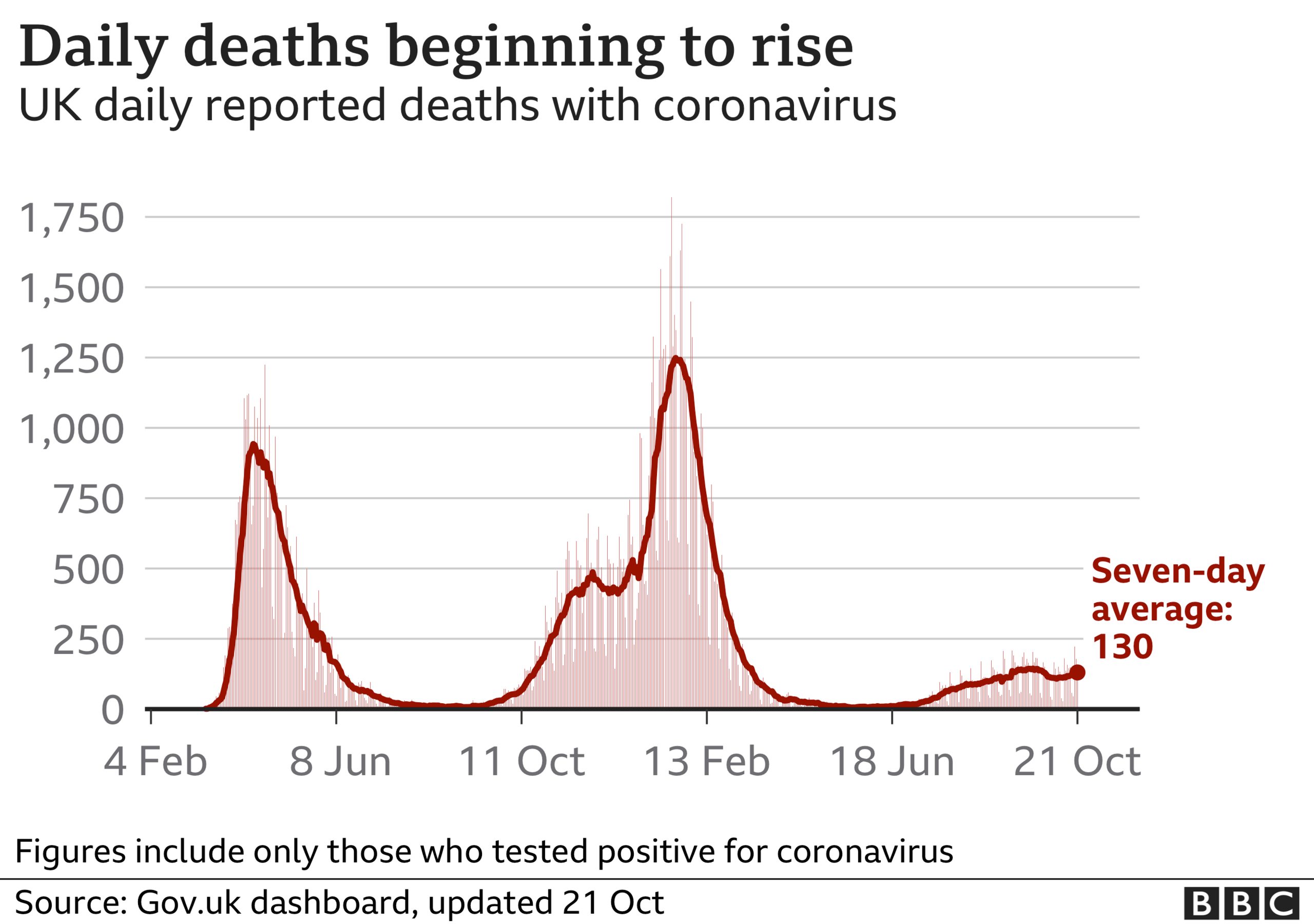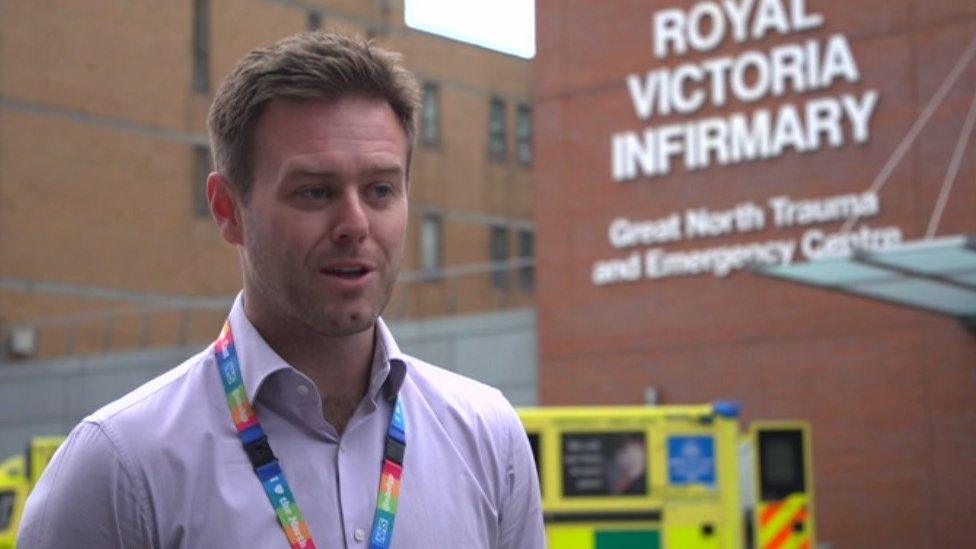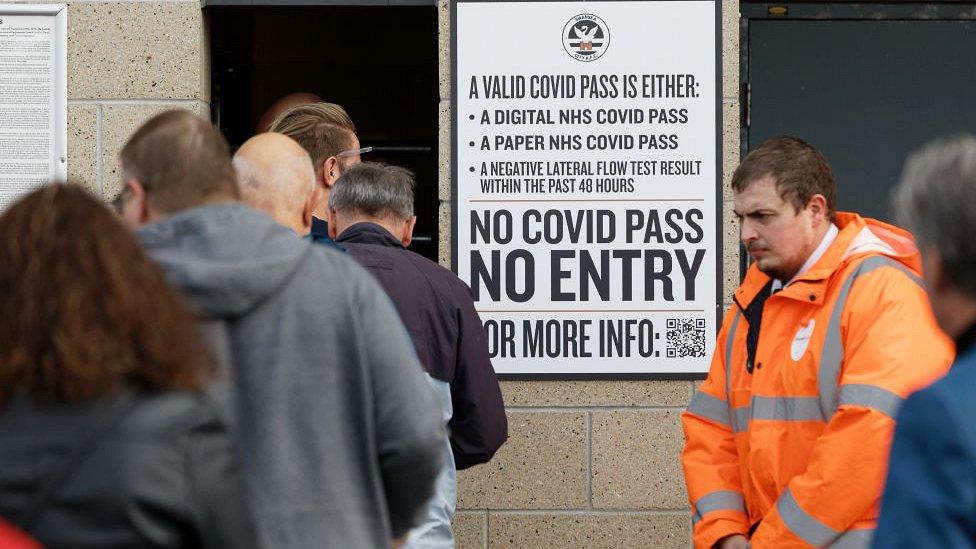Covid: UK cases top 50,000 for first time in three months
- Published
- comments
Boris Johnson on Covid: "We are sticking with our plan."
More than 50,000 Covid cases have been recorded in the UK for the first time since 17 July.
Amid calls for more restrictions, Boris Johnson urged people to come forward for booster jabs when their time comes.
The prime minister said those who become eligible for a third dose of vaccine should organise an appointment straight away.
The UK recorded 52,009 new Covid cases on Thursday - alongside 115 deaths within 28 days of a positive test.
Mr Johnson said, despite high cases, the government was "continuing with its plan" and that things were much better now than a year ago.
He said that was in large part thanks to the rollout of the vaccine, which has weakened the link between cases, hospitalisations and deaths.
Reported cases on 17 July were 54,674 and came several weeks after more households could mix together and indoor hospitality resumed.
Doctors are demanding ministers trigger England's "Plan B" - which would reimpose rules such as mandatory face masks and working from home advice.
Speaking in Northern Ireland, Mr Johnson said that the numbers of infections and deaths being seen were "within the parameters of what the predictions were... given the steps we've taken".
It was also because the country was in an "incomparably better position than last year because of vaccines" that there was more confidence around the current plan in place," he said.
He also insisted that the "most important thing people can do is get that booster jab" and that "when you get the call, get the jab".
The PM appealed for 12 to 15-years-old to get their first vaccination because there was "no shortage of supply" and there were "huge quantities" of vaccine available.
An estimated 4.7 million booster doses - which come at least six months after second jabs - have now been delivered in the UK.


Labour leader Sir Keir Starmer said ministers were letting the "security wall against the virus... crumble" and the booster programme was "stalling".
But Prof Jeremy Brown, an adviser to the government on vaccines, said Sir Keir's criticism was "not an accurate description of what's going on".
"The problem at the moment [is] the people coming to hospital with severe Covid and ending up in intensive care and dying are those who've not had any vaccines," he told BBC Radio 4's PM programme.
Under the government's plan for tackling Covid in England over the winter, the strategy currently in operation is Plan A.
It involves offering booster jabs to about 30 million people and offering a single vaccine dose to healthy 12 to 15-year-olds, as well as encouraging ventilation for indoor gatherings, hand-washing and face masks in crowded places.
Daily UK infections have been above 40,000 for nine days in a row.

What's in the daily stats?
Analysis by BBC health reporter Philippa Roxby
Daily cases of coronavirus in the UK continue to rise - now going past 50,000 - and hospital admissions are rising closer to 1,000 a day, but daily deaths have fallen slightly.
Cases last went above 50,000 in mid-July and then fell steeply without any further restrictions being introduced.
It's possible that could happen again now, but that's reliant on several things happening.
The current strategy is to speed up vaccinations - in the form of boosters to the most vulnerable, and first doses to young teens and the five million unvaccinated - to increase protection among the population.
Free testing is also part of that plan, and one reason why the UK has one of the highest Covid rates in Europe.
In 10-19 year olds, these have reached a record high and there are concerns that infections could leak into other age groups.
A change in people's behaviour now could bring cases down and reduce growing pressure on the NHS ahead of winter.
Scientists say it's difficult to predict what could happen over the next few weeks - but the UK is in a very different place to last autumn, when the Covid vaccination programme hadn't even started yet.

Case rates are rising in all but one region of England, the UK Health Security Agency said, with the lowest rates in London.
Rates of Covid were highest in those aged 10 to 19-years-old, with the lowest seen in those over 80.
There were 8,142 patients with Covid in hospital as of Wednesday, the latest data showed, with 872 patients with Covid in beds equipped with ventilators.
Dr Chaand Nagpaul, chairman of the doctors' union the British Medical Association, said it can "categorically" say that the "time is now" for starting Plan B.
He stressed that case numbers were comparable to March, when England was in lockdown, and were "unheard of in similar European nations".
"It is therefore incredibly concerning that [Mr Javid] is not willing to take immediate action to save lives and to protect the NHS," he said.

Who will get a booster?
Across the UK, booster jabs are being offered to:
Over-50s
Frontline health and social care workers
Older adults in residential care homes
People aged 16-49 years old with underlying health conditions which put them at greater risk of severe Covid
Adults who share a household with vulnerable people
The dose must be given at least six months after a second vaccination, and will typically be either Pfizer or Moderna.

But Health Secretary Sajid Javid said on Wednesday that "at this point" the government would not introduce its Plan B measures.
However, he also warned insufficient vaccine uptake would make restrictions in England more likely.
And he said infections could soon rise to around 100,000 per day.
In other developments:
Royal Cornwall Hospitals NHS Trust declares a critical incident due to pressures it is facing
The PM's official spokesman says reports that a harsher so-called Plan C for England is in the works are "not accurate"
Covid has severely affected health care staff and may have killed between 80,000 and 180,000 globally, the World Health Organization says
Commons Leader Jacob Rees-Mogg suggests Tory MPs do not need to wear masks while debating because they know each other
Strictly Come Dancing star Judi Love tests positive for coronavirus and will miss this weekend's shows

SHOULD ONE ORGANISATION HAVE SO MUCH INFLUENCE?: Stephen Nolan investigates the power of Stonewall
THE AWARD FOR MENDING THE PLANET: What is the Earthshot Prize?

Related topics
- Published21 October 2021

- Published21 October 2021

- Published20 October 2021
- Published1 July 2022

- Published22 October 2021

- Published2 April
